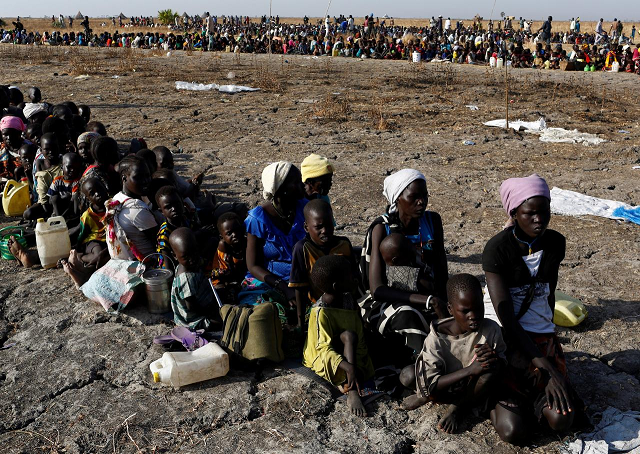Microsoft, Google join fight to prevent famine
124 million people currently live in crisis levels of food insecurity

Women and children wait to be registered prior to a food distribution carried out by the United Nations World Food Programme (WFP) in Thonyor, Leer state, South Sudan, February 26, 2017.
PHOTO: REUTERS
Rather than waiting to respond to a famine after many lives already have been lost, the tech firms "will use the predictive power of data to trigger funding" to take action before it becomes a crisis, the World Bank and United Nations announced in a joint statement.
Google retreating from military AI project: reports
"The fact that millions of people -- many of them children -- still suffer from severe malnutrition and famine in the 21st century is a global tragedy," World Bank Group President Jim Yong Kim said in a statement. "We are forming an unprecedented global coalition to say, 'no more.'"
Last year more than 20 million people faced famine conditions in Nigeria, Somalia, South Sudan, and Yemen, while 124 million people currently live in crisis levels of food insecurity, requiring urgent humanitarian assistance for their survival, the agencies said. Over half of them live in areas affected by conflict.
The Famine Action Mechanism (FAM) will provide early warning signs to identify food crises that could become famines, and trigger pre-arranged funding plans to allow early intervention.
"If we can better predict when and where future famines will occur, we can save lives by responding earlier and more effectively," Microsoft President Brad Smith said in a statement.
Google, Microsoft and Amazon Web Services and other technology firms are providing expertise to develop a suite of analytical models called "Artemis" that uses AI and machine learning to estimate and forecast worsening food security crises in real-time. These forecasts will help guide and promote decision-makers to respond earlier.
Amazon hits trillion-dollar milestone with focus on the long game
"Artificial intelligence and machine learning hold huge promise for forecasting and detecting early signs of food shortages, like crop failures, droughts, natural disasters, and conflicts," Smith said.
The FAM will initially be rolled out in a small group of vulnerable countries building up to ultimately provide global coverage. On October 13, leaders dedicated to this initiative will gather as part of the IMF-World Bank Annual Meetings in Bali, Indonesia to discuss further implementation.



















COMMENTS
Comments are moderated and generally will be posted if they are on-topic and not abusive.
For more information, please see our Comments FAQ